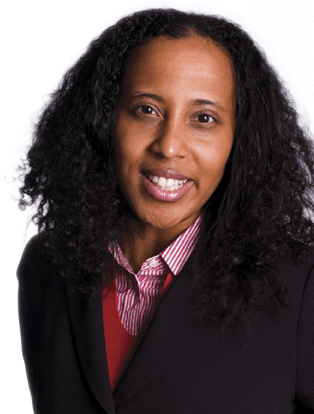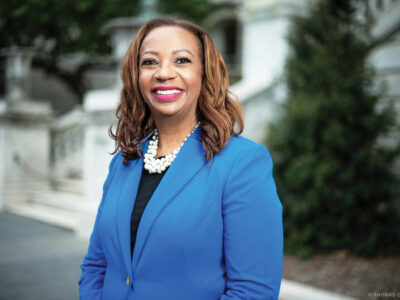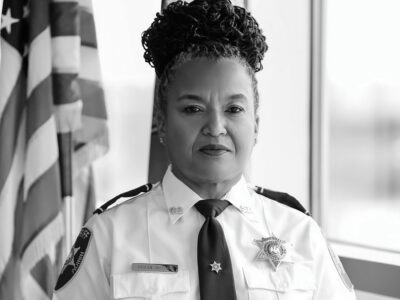
Class of ’99 | It wasn’t until she went to Tanzania that Donyale Reavis L’99 realized what she could do back home. She had traveled to the African country for a summer job—working on a joint venture between government ministries and a private company developing the country’s natural-gas reserve —and planned on eventually becoming an international lawyer. She came back with a whole new mindset.
“In Tanzania, I got a much better appreciation of how many opportunities there are right in my own backyard,” says Reavis. “I wanted to bring my talents to bear on poor communities in the United States, where you have a free press, free government, history of civil rights, change, growth—at least on paper—and, in practice, people committed to ending racism.”
She has parleyed those talents into an intellectual-property law firm representing musicians and other artists, and a political-action committee supporting professionals of color.
Both of those interests had already begun to show themselves while Reavis was at the Law School, working for Penn’s Center for Community Partnerships on incorporating technology into school curricula. “I learned while I was at Penn that if a community is not organized, that community goes unheard,” she says.
She already knew a thing or two about politics, having worked for Boston Mayor Thomas Menino before arriving at the Law School in 1996, and for Philadelphia Mayor John Street’s election campaign after receiving her law degree in 1999. There she developed a mentor-mentee relationship with Greg Naylor, who was then working for U.S. Congressman Chaka Fattah GPU’86, a Democrat from Philadelphia. Though she had left Philadelphia to work at the Washington, D.C., office of Fried Frank Harris Shriver & Jacobson, she would return to work on political campaigns, including the 2000 Gore-Lieberman campaign in Philadelphia, and as counsel to the election campaign of Pennsylvania Governor Ed Rendell C’65 Hon’00 in 2002.
She was still at Fried Frank when she started a program for inner-city youth called kaPow!, which taught students the business of music production through the creation of a virtual record label. The name came from the feeling Reavis would get when she had an epiphany of understanding in her law-school classes. “I wanted to be able to mimic that kind of enthusiasm for learning and growing among inner-city youth, using media literacy as a tool for nurturing critical thinking skills,” she says.
Eventually, Reavis realized she would have to make a change to bring the divergent parts of her life into one place.
“Trying to fit myself into the box of corporate law practice was ultimately a losing battle that I didn’t want to continue to wage,” Reavis said. “I had a political, creative, non-profit side of me.”
She returned to Philadelphia three years ago to found the firm Elam Reavis with James Elam, who practiced entertainment law. Elam Reavis represents local artists like jazz singer Jill Scott and rapper Freeway, as well as comedians, filmmakers, and event promotions.
As the offspring of artists—her father is a jazz drummer and her mother a museum curator—Reavis savors the opportunity to put her legal training to work helping creative people, negotiating contracts ranging from music licensing to distribution agreements.
“I just love being so close to creativity,” she says. “It’s particularly important for me in relation to artists of color who rarely have the opportunity to have good counsel. To be in this industry and not be represented by good counsel is downright dangerous.”
In 2003, she helped Greg Naylor create the Millennium Action Committee, or MACPAC-PA, a political group for professionals of color that advocates for candidates. “We felt that we had started a new model for community organizing and for creating a different agenda to be reckoned with,” Reavis says. MACPAC-PA became the Pennsylvania arm for the national America Coming Together coalition, a group of liberal and Democratic-leaning organizations ranging from NARAL Pro-Choice America to Human Rights Watch to labor unions.
Reavis continues to work in politics indirectly with public-finance work, helping charitable organizations get public bonds to facilitate new construction projects.
“I know I’ve created building blocks for real change for communities,” Reavis says, citing her work acquiring a $5 million bond on behalf of an African-American charter school, which will double its size and build a recreational center.
This past December, Philadelphia magazine named Reavis one of “15 Under 45” African Americans to watch in Philadelphia. She was amused—and flattered.
“I just felt affirmed, that all of my sacrifice and hard work and nontraditional decisions were not for naught,” she says. “So many people with passion struggle to achieve dreams in the dark. Here’s one that actually brought it to light. I’ll continue to pursue them, whether it’s in a magazine or not. It’s what I love.”
—Jordana Horn Marinoff C’95 L’99




